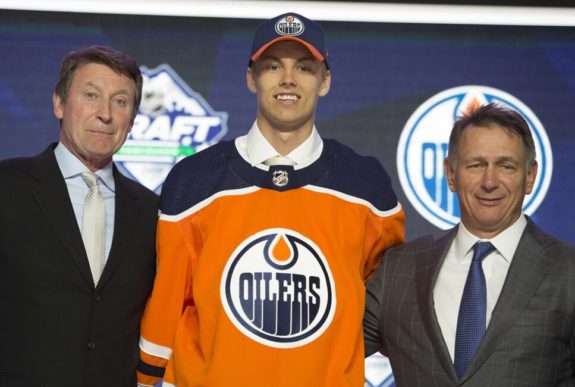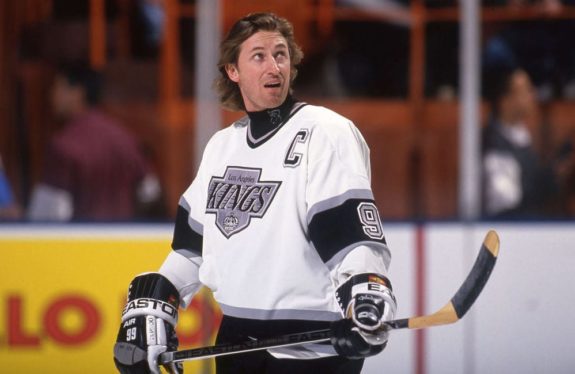Last Wednesday (May 26), Turner Sports announced that it had reached a multi-year agreement with Wayne Gretzky to provide studio analysis when it begins broadcasting National Hockey League games on TBS and TNT next season. Gretzky had only one day earlier (May 25) resigned as a partner and Vice Chairman with the Edmonton Oilers, a role he had since joining Oilers Entertainment Group (OEG) on Oct. 12, 2016.
Now I’m not entirely sure what Gretzky did as a partner and Vice Chairman. He was not involved in day-to-day dealings with the media during his time in the Oilers front office. His official team bio didn’t provide a ton of clarity, stating only that Gretzky works both “closely with owner Daryl Katz, and Oilers Chairman Bob Nicholson in all aspects of the organization” and “with the OEG team on the commercial side of the business to attract world-class sports and entertainment partnerships and events to Rogers Place, as well as supporting development initiatives in ICE District.”
Whatever that amounted to, your guess is as good as mine. But I do know this much: Gretzky hugely positively impacted the Oilers over these last five seasons.
Righting Wrongs
The world was made right again when Gretzky returned to the Oilers, 28 years, two months and three days (not that anyone was counting) since the superstar center was shockingly dealt to the Los Angeles Kings on Aug. 9, 1988.
Gretzky had been with the Oilers from day one in the NHL in 1979 and was part of four Stanley Cup championships in the ‘80s. He was both the greatest player on the planet and the most beloved person in Edmonton.
While the Oilers won another Stanley Cup in 1990, the franchise arguably never fully recovered from the Great One’s departure. For most of the ‘90s and into the ‘00s, the Oilers fought to simply remain competitive. Perennially hamstrung by a tight budget, they could hang on to their top players for only so long until the price got too high, never mind attracting high-caliber free agents to the northernmost locale in major pro sports.

Fans certainly didn’t get over the trade. It was widely seen as a cash-grab (the Oilers received $15 million as part of the transaction, an astronomical sum for the time) by owner Peter Pocklington, who only became increasingly unpopular right up until 1998 when he sold the team to a group of local businesspeople (the Edmonton Investors Group) following multiple threats of the Oilers moving south.
Katz purchased the team in 2008, but he too fell out of public favor. Contentious negotiations with Edmonton city hall to build a new downtown arena (what would become Rogers Place) led to Katz threatening relocation of the Oilers to Seattle (for which he swiftly apologized). Seasons of losing only exacerbated the owner’s fraught relationship with Oil Country. And while the Oilers drafted generational talent, Connor McDavid, with the first overall pick in 2015, they would miss the playoffs for a 10th straight season.
This brings us back to Oct. 12, 2016, hours before the Oilers first game of the 2016-17 season and the official opening of Rogers Place, when Nicholson and Katz shocked everyone (maybe even nearly as much as Pocklington did by announcing the 1988 trade) by declaring that the Great One was back in the fold.
“It’s an announcement that is so special in this city but also going to be so special around the world.”
Bob Nicholson (From ‘Wayne Gretzky announcement reconnects Hall of Famer with Edmonton’, The Edmonton Sun, 10/13/16)
In an instant, old wounds healed, hatchets were buried, and water flowed under the bridges of Oil Country. And across the hockey world, the perception of Edmonton and the Oilers changed.
Universally admired and widely regarded as the GOAT, Gretzky brought immediate credibility and exposure in his return to the Oilers. That the man who left Edmonton for Hollywood nearly three decades earlier, becoming a global superstar, was willing to come back to this relatively small pond far removed from the bright lights spoke volumes: if Edmonton is good enough for Gretzky, who isn’t it good enough for?
Gretzky was an ambassador for the team and, by extension, the city, which was forever fighting an uphill battle against its reputation as a northern outpost where it snows 11 months of the year. Crucially, he was around a lot. He didn’t just say Edmonton was a place you wanted to be; he showed the Oilers was a team he wanted to be around.
McDavid‘s Mentor
In the 2017 off-season, the Oilers signed McDavid to an eight-year, $100 million contract extension, the biggest deal in NHL history. Then they inked Leon Draisaitl, McDavid’s running mate, to an eight-year, $68 million contract extension. The last time the Oilers had been able to sign such elite talent for such long tenure was when Gretzky himself agreed to a 10-year deal in 1979.
Arguably the player closest to being without peer since Gretzky (he’s already a three-time Art Ross Trophy recipient and soon to be a two-time Hart Memorial Trophy winner), McDavid surely benefitted from the presence of The Great One, especially considering McDavid was just 19 and starting his second NHL season when Gretzky came aboard.
“I just try to take lessons, just from the way (Gretzky) handles himself. The way he is with fans, with media,” McDavid said in a 2017 article. “It’s really, really remarkable how involved he still is in the Oilers organization. He still wants to be a part of it and give back. That’s definitely something I admire about him.”
The Greater Good
Gretzky’s 1988 move to the Kings sparked an explosion of interest in the NHL across the United States, propelling the sport’s growth in new, non-traditional markets. NHL teams in the Tropics. Kids growing up playing hockey in the desert. None of that happens if Gretzky doesn’t go to L.A. and completely embraces the responsibility of being the “Face of the Game” and bringing hockey to the masses.

Now, at a pivotal moment for the NHL, as it fights to remain relevant opposite juggernauts like the National Basketball Association and the National Football League while facing the challenges of increasingly fractured audiences, Gretzky again can help expand hockey’s reach.
Joining Turner, which has been key to the NBA reaching present heights, “gives me an opportunity to talk about the game and try to take it to another level,” Gretzky told the Associated Press in an interview, adding, “I think everyone has a responsibility who was a player in the National Hockey League to try to grow the game, and if I can be part of making Turner a positive venue for people to watch, I’m all for it.”
As a player, Gretzky put Edmonton on the map, then he spread hockey across the map.
As an executive, he helped set the stage for what Oilers fans hope becomes another championship team. And now, as an analyst, he could help set the stage for what the NHL hopes becomes another surge in popularity.